Perfection And 20K Miles: 1963 Rover 110
One look at this British classic and I’m ready for a smoking jacket, pipe and slippers! This low mileage, rare, left-hand drive 1963 Rover 110, also known as a P4, is located in Philadelphia, Pennsylvania, and is available, here on craigslist for $22,000. Thanks to Russell G. for this tip!
The Rover P4 was considered a mid-size “saloon” and manufactured between 1949 and 1964. There were successive models built and identified with a numeric designation. The 110, like this example, was produced between 1962 and 1964 yielding about 4,600 copies. Export statistics are sketchy but it appears that less than 600 were constructed for export with left-hand drive. This Rover was first exported to Switzerland and then found its way to Holland. It arrived in the U.S. in 2008 and has had the same owner for the last twelve years.
The seller, which has this Rover listed for sale in more than one place, claims 32,000 kilometers as its mileage – that would translate into about 20,000 miles, low indeed, especially for a 57-year-old car. One of the immediately noticeable features of this Rover is its “suicide” rear doors. That body style is perfectly accentuated with this Rover’s gleaming, original, black finish. The seller adds, “Fantastic Patina Scattered Throughout”. Perhaps so, but there is none that is noticeable among the exterior images. Chrome, trim, grille all appears to be in fantastic condition. Body panels and shunt lines too, nothing seems out of place.
The original treatment continues inside too. The seller lists it as all original but I find it unusual that the rear seat shows typical leather creasing but neither of the front seats do – it would seem they have been reupholstered but not so according to the listing. Whatever the case, the interior is magnificent in that old British automobile way – it just oozes class, charm and purposeful design. The camel color carpet is remarkable for holding up as well as it has, even with so few miles. It’s a tough shade to keep clean!
We should do a series on car radios, they have all but disappeared as they have become so integrated into touch screens with HVAC controls and internet connections. Old car radios had an identity all their own and there have been artful renditions created over the years. The “PLAYMATE” radio in this Rover appears as if it’s ready to receive a signal from the BBC.
There is no image of what’s under the bonnet, so here’s one from under the boot showing original tools, jack, license plates and manuals – all very meticulous. As for the engine room, it is known that this Rover 110 is powered by a 123 HP, 2.6 liter, in-line six-cylinder engine, driving through a four-speed manual transmission. This engine was the most powerful utilized in the P4 series. The seller states, “Mechanically this car is very strong and runs and drives very well.” The listing mentions that regular maintenance has occurred.
There is more information on this Rover P4 at LBI Limited where you can review additional pictures. The seller also mentions that this Rover comes with a British Motor Industry Heritage Trust certificate and you can learn more about that at BMIHT. There is a lot here to consider, this is an excellent example of mid-century British motoring, something not seen often anymore, especially on our domestic shores. This may well be the best, low mileage example available. Any interest?
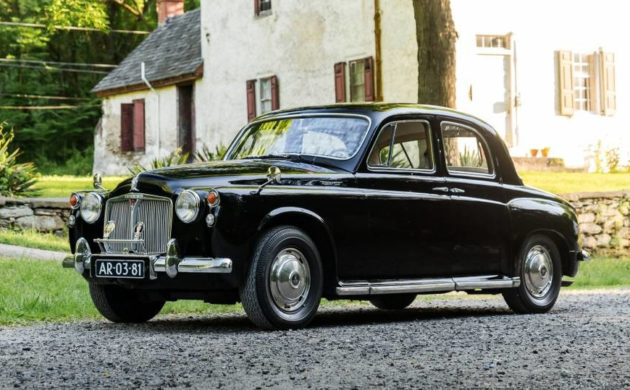
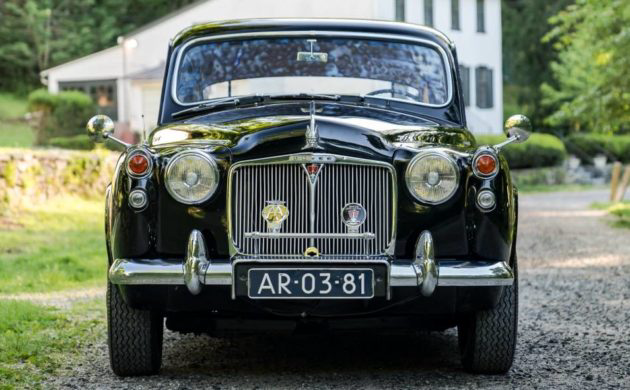
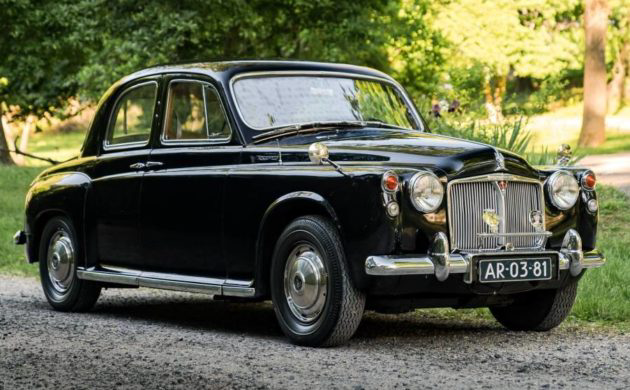
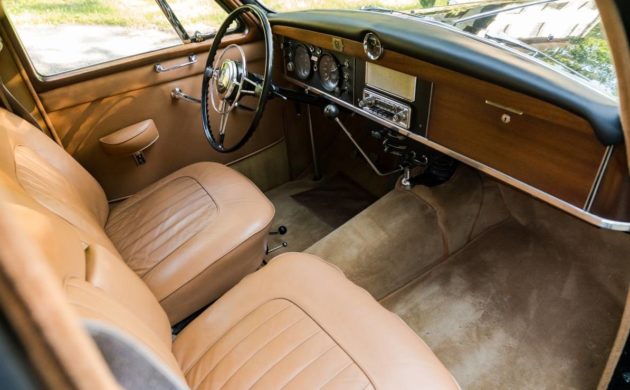

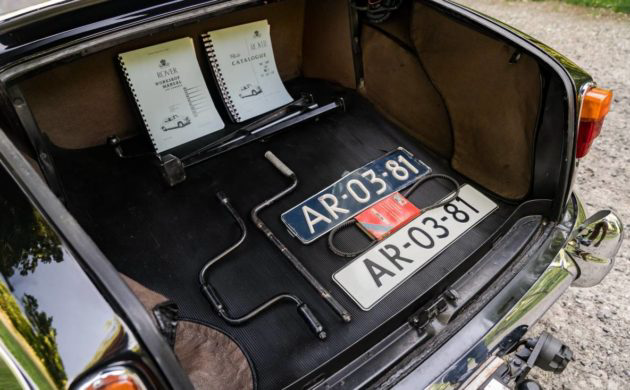
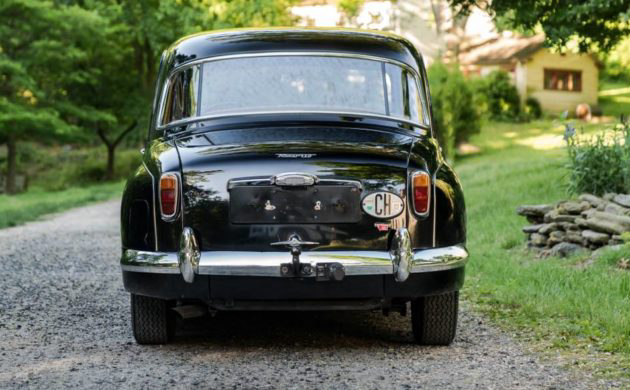



Comments
As big as I am on restomods …I would take a ruler to the hands of anyone who changed even so much as a light bulb on this beauty. Cool car.
Why is it for sale ? Did Alfred get tired of driving Bruce Wayne around with a manual transmission or something ?
Alfred is much older today so Bruce bought Automatic
Great Car
Fantastic motorcars were that era Rover. A boss of mine bought a new 105 back in 1958 and we all drooled over that car. To check the oil all you had to do was press a button on the fuel gauge and the needle would swing to wherever the oil level was. I had the chance to buy a 110 about 5 years ago but, being a purist, I backed out as it had been converted to disc brakes and magnesium wheels. Instead I bought a 1959 Borgward Isabella TS. Nothing to complain about with the Borgward but I really should have bought the Rover.
Perfection. Just add a trilby and a sheepskin car coat!
I can’t explain why this strikes such a chord with me, but this is one charming car. I don’t need it, but gosh do I live it! Just oozes of good taste and genteel lifestyle.
I’ve never seen a car intentionally designed to look like one of those gag cars where they weld to 2 font halves to each other……till today…..
What about the early 50s (and late 40s) Studebakers?
Yes, I agree with many of you; this would be a great car to own.
Haven’t you ever seen a ’48 Studebaker, a’59 Fiat Multipla or any Janus automobile? All of them easy to get the front or rear confused.
The only thing missing is Emma Peel.
Emma Peel (Diana Rigg) drove a Lotus Elan roadster.
Steed was the Rover/Jaguar man.
Emma Peel also drove a Triumph GT6. Steed had a 30s Bentley touring car.
Beautiful. A mini Bentley!
Cool and classy old Brit but when I think if it that’s an OLD design for a ’63! American car design was lightyears ahead this Rover when it was phased out the following year.
Its tail lights look very similar to the ones utilized on the Mini mk1 or its van or pickup siblings. Can it be the same light…? Apparently different British automakers made use of a selection of ‘standard’ tail lights back then; pretty much like Wrangler tail lights used to be found on everything from trailers to big rig tractors
Local-Sheriff,
Back before rear lights became styling elements, manufacturers like Lucas of Birmingham, England, had catalogs filled with various types & styles of lamps, these versions included
This was at the time in Europe & the UK when lamps were something that the car company stuck onto the back of the car, rather than incorporating lamps into the body.
The P4 design debuted in 1949. Also in 1963 Rover introduced their P6 which was extremely sophisticated.
And then they brought out the SD1. I had previously owned a P5b V8, which I thought was the best of the best, but the SD1 V8 was even better IMO. Both of them were automatics as well. As for Peter K’s observation, I don’t think they ever had a 5 speed gearbox, and if they did, never 5 on the tree.
With the references to a smoking jacket, pipe, and slippers and a radio named “Playmate” is there not a copy of Playboy hidden in the glovebox?
In perhaps 64 when I worked at a SOHIO station, a customer bought a Rover. I do not recall the model. If she did not start it every day, it would not start. Fortunately she lived only a block away. I do not recall what the problem with starting was – it was a fuel problem not a spark or battery problem – but since the dealer was unable or incapable of repairing the car, she traded it in on a Mercury Station Wagon.
How difficult could it be?!
i had a Rover 75. even with the aluminum hood trunk and doors it still weighed a whopping 4000 lbs. in this example above the 5 speed column shifter is gone as well as the clutch release that allowed you to shift without depressing the pedal. the motor in these cars is actually a hemi six with one or two carbs.
The Rover used an “F Head” six, much like a Bentley or Rolls-Royce from 1946 – 1959. As such, the exhaust valves are in the block, only the intake valves are overhead. Nothing hemispherical about it.
Wasn’t that setup known as either “pocket or poppet” valve?
ken tillyUK is correct: the relative angles of the valves and the contour of the head give a very compact combustion chamber, not unlike a “wedge-head” OHV engine. Both Rover and Rolls/Bentley used this design. What it lacked in volumetric efficiency it gained in smooth, silent running, or so I’ve read. FWIW I just now went and looked this up in Colin Campbell’s “The Sports Car” book, dating from the 50s but still quite valuable. Especially if we’re discussing cars as old as we are!
These things had a Freewheel attachment to the gearbox,though probably not as late as this one
As nice as this car appears to be, I think the seller is going to have a hard time reaching his price. Here in USA no one grew up hoping to own an old Rover like this. Should appeal to an ex-pat Brit in his 60s or 70s but it’s LHD so where’s the charm in that??
If memory serves, the engine in this has an “F” head. Intake valves in the head and exhaust in the block I believe. They were touted as the worlds safest automobile, with claims such as “nobody has ever been killed in a Rover!”
@ken tillyUK.
Back in the day of working on these and other F-head engines (in NZ of all places) I remember seeing in some shop manuals a reference to the valves as being “Pocket Valves” — but technically, any valve that is (somewhat) shaped like a tulip can be referred to as a “Poppet” valve and the term “Pocket” most likely referred more to the position of the valve seats (in the block) rather than the valves themselves.
Mindless trivia, I know.
RB
Thanks for the clarification Reg.
Here’s one for the Harley boys. Way back when, I owned a 1925 Harley with an engine number that started with the prefix JE, a very knowledgeable friend of mine remarked that it had “pocket valves.” Could that have been correct?
BRBRBR, I always become angry when I see:
and then found its way to Holland.
This is terrible. This car found its way to the NETHERLANDS.
Holland and the Netherlands is not the same, although people in Holland think, there is nothing more than Holland here.
But Holland represents only 2 provincies of the 12 there are here.
Something like this car found its way to New York, while it was in California.
And “poppet” is a term of endearment, for a little one, derives, long ago from “puppet”, for what it is worth. The President of Yale in the mid-60’s drove a Rover, his name was a very royal sounding Kingman Brewster. He was a good guy.